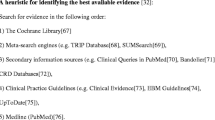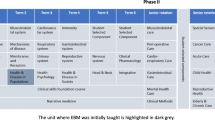Abstract
CONTEXT: As medical schools turn to community physicians for ambulatory care teaching, assessing the preparation of these faculty in principles of evidence-based medicine (EBM) becomes important.
OBJECTIVE: To determine the knowledge and attitudes of community faculty concerning EBM and their use of EBM in patient care and teaching.
DESIGN: Cross-sectional survey conducted from January to March of 2000.
SETTING: A clinical campus of a state medical school; a midwestern city of a half-million people with demographics close to national means.
MAIN OUTCOME MEASURES: Comparisons of community faculty with full-time faculty in perceived importance and understanding of EBM (5-point scale), knowledge of EBM, and use of EBM in patient care and teaching.
MAIN RESULTS: Responses were obtained from 63% (177) of eligible community faculty and 71% (22) of full-time faculty. Community faculty considered EBM skills to be less important for daily practice than did full-time faculty (3.1 vs 4.0; P<.01). Primary care community faculty were less confident of their EBM knowledge than were subspecialty community or full-time faculty (2.9 vs 3.3 vs 3.6; P<.01). Objective measures of EBM knowledge showed primary care and subspecialty community faculty about equal and significantly below full-time faculty (P<.01). Thirty-three percent of community faculty versus 5% of full-time faculty do not incorporate EBM principles into their teaching (P<.01).
CONCLUSIONS: Community faculty are not as equipped or motivated to incorporate EBM into their clinical teaching as are full-time faculty. Faculty development programs for community faculty should feature how to use and teach basic EBM concepts.
Similar content being viewed by others
References
Brinko KT. The practice of giving feedback to improve teaching: what is effective. J Higher Educ. 1993;64:574–93.
Irby DM, Ramsey PG, Gillmore GM, Schaad D. Characteristics of effective clinical teachers of ambulatory care medicine. Acad Med. 1991;66:54–5.
Irby DM. Clinical teacher effectiveness in medicine. J Med Educ. 1978;53:808–15.
Bordage G, Burack JH, Irby DM, Stritter FT. Education in ambulatory settings: developing valid measures of educational outcomes, and other research priorities. Acad Med. 1998;73:743–50.
Ferenchick G, Simpson D, Blackman J, DaRosa D, Dunnington G. Strategies for efficient and effective teaching in the ambulatory care setting. Acad Med. 1997;72:277–80.
Hewson MG, Little ML. Giving feedback in medical education: verification of recommended techniques. J Gen Intern Med. 1998;13:111–6.
Jaeschke R, Guyatt G, Sackett DL. Users’ guides to the medical literature. III. How to use an article about a diagnostic test. A. Are the results of the study valid? Evidence-Based Medicine Working Group. JAMA. 1994;271:389–91.
Guyatt GH, Sackett DL, Cook DJ. Users’ guides to the medical literature. II. How to use an article about therapy or prevention. A. Are the results of the study valid? Evidence-Based Medicine Working Group. JAMA. 1993;270:2598–601.
McAlister FA, Graham I, Karr GW, Laupacis A. Evidence-based medicine and the practicing clinician. J Gen Intern Med. 1999;14:236–42.
Association of American Medical Colleges. 1999 Medical school graduation questionnaire: all schools report. Available at: http://www.aamc.org/data/gq/allschoolsreports/1999.pdf. Accessed June 17, 2002.
Green ML. Evidence-based medicine training in internal medicine residency programs: a national survey. J Gen Intern Med. 2000;15:129–33.
Slawson DC, Shaughnessy AF. Teaching information mastery: creating informed consumers of medical information. J Am Board Fam Pract. 1999;12:444–9.
Wadland WC, Barry HC, Farquhar L, Holzman C, White A. Training medical students in evidence-based medicine: a community-campus approach. Fam Med. 1999;31:703–8.
Smith CA, Ganschow PS, Reilly BM, et al. Teaching residents evidence-based medicine skills: a controlled trial of effectiveness and assessment of durability. J Gen Intern Med. 2000;15:710–5.
Linzer M, Brown JT, Frazier LM, DeLong ER, Siegel WC. Impact of a medical journal club on house-staff reading habits, knowledge, and critical appraisal skills: a randomized control trial. JAMA. 1988;260:2537–41.
Landry FJ, Pangaro L, Kroenke K, Lucey C, Herbers J. A controlled trial of a seminar to improve medical student attitudes toward, knowledge about, and use of the medical literature. J Gen Intern Med. 1994;9:436–9.
Evidence-Based Medicine Working Group. Evidence-based medicine: a new approach to teaching the practice of medicine. JAMA. 1992;268:2420–5.
Society of Teachers of Family Medicine. Preceptor education project, 2nd Ed, (PEP2). Available at: http://www.stfm.org/ffi/overview/pep2.html. Accessed June 17, 2002.
Evans CE, Haynes RB, Gilbert JR, Taylor DW, Sackett DL, Johnston M. Educational package on hypertension for primary care physicians. Can Med Assoc J. 1984;130:719–22.
Author information
Authors and Affiliations
Corresponding author
Rights and permissions
About this article
Cite this article
Beasley, B.W., Woolley, D.C. Evidence-based medicine knowledge, attitudes, and skills of community faculty. J GEN INTERN MED 17, 632–639 (2002). https://doi.org/10.1046/j.1525-1497.2002.11110.x
Issue Date:
DOI: https://doi.org/10.1046/j.1525-1497.2002.11110.x




